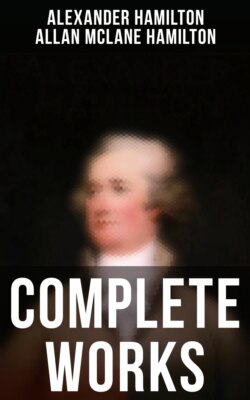Читать книгу Complete Works - Hamilton Alexander - Страница 20
На сайте Литреса книга снята с продажи.
ОглавлениеAppendix C
Table of Contents
(PAGE 64)
THE RIVINGTON TRACTS
THE series of tracts issued chiefly from Rivington's press, in New York City during 1774 and 1775, consisted of twenty pamphlets and rejoinders from the Patriots, and in the beginning preceded the movement to send delegates from the Province of New York to the General Congress in Philadelphia. According to Evans,1 the secret service fund of the British Government was largely drawn upon to subsidize the printing office of the Tory printer. This writer says: "The friends of American Liberty found arrayed against them an opposition made up of the Church of England. In fact, in its controversial phases, the struggle for civil liberty in the American Colonies assumed something of the nature of religious warfare, in which dissenting churches were opposed by the Established Church of England." This was, undoubtedly, a further evolution of the spirit of antagonism that, in the seventeenth century, led to the exodus of the little band of Englishmen who landed in Massachusetts Bay. It was, therefore, to be expected that the Tory opposition would be represented by a clergyman, and we find the Rev. Myles Cooper, the president of King's College, taking an active part.
He it was whom Alexander Hamilton helped to escape from the infuriated patriots who surrounded the college, during Hamilton's fiery and eloquent speech delivered from the doorstep. Cooper, after listening with indignant surprise from a window above, reluctantly made his exit from a back door, and sought the protection of the English man-of-war in the harbor. Cooper's first pamphlet was signed "A North American," and was entitled The American Querist. This inflamed the already exasperated "Sons of Liberty," and he was in danger of violent treatment, and ultimately left the country. Shortly afterward Bishop Seabury of Connecticut wrote several tracts taking the "Tory" side. His first was entitled "A Friendly
Address to All Reasonable Americans on the Subject of our Political Confusionst,"and was answered by Philip Livingston by "The Other Side of the Question, or a Defense of the Liberties of North America". The pseudonym chosen by Seabury was "A. W. Farmer", his purpose having been to turn the agricultural class against the proposed measures that were to be introduced into the coming Congress, and to convey the idea that he was an actual farmer of Westchester County. Meanwhile General Charles Lee wrote "Strictures on a Pamphlet Entitled a Friendly Address to all Reasonable Americans, etc.", with the quotation from Shakespeare, "Let's canvass him in his Broad Cardinal's Hat". This was published by the Bradfords in Philadelphia.
Subsequently Seabury wrote "Free Thoughts on the Proceedings of the Continental Congress Held at Philadelphia, Sept. 4, 1774"." This drew forth Hamilton "Full Vindication, etc.", to which reference has been made. In two or three weeks Seabury published, under his original pseudonym, "The Congress Canvassed; or, an Examination Into the Conduct of the Delegates at the Grand Convention Held in Philadelphia, Sept. 1st, 1774". In 1775 Hamilton issued his second rejoinder to Seabury, under the title of "The Farmer Refuted or a More Impartial and Comprehensive View of the Dispute Between Great Britain and the Colonies, Intended as a Further Vindication of the Congress". In the meantime spirited attacks were indulged in, and other tracts were published. One of these was entitled "An Alarm to the Legislature of the Province of New York occasioned by the Present Political Disturbance in North America", and was issued from Rivington's press. Another was entitled " What Think Ye of the Congress Now?" erroneously attributed to the Rev. Thomas Bradbury Chandler. Joseph Galloway, who had joined the American troops, but had deserted and espoused the Tory side, wrote "A Plan of a Proposed Union Between Great Britain and the Colonies", and "A Candid Examination of the Mutual Claims of Great Britain and the Colonies; with a Plan of Accommodation on Constitutional Principles". He also later published other tracts in England.
After Hamilton's "Farmer Refuted" appeared, it was answered by Isaac Wilkins, who, under the pseudonym of "A Country Gentleman", prepared a tract called "The Republican Dissected; or, the Anatomy of an American Whig". This, however, did not, at the time, appear, for a company from Connecticut descended upon Rivington's premises, wrecked his presses, and scattered Wilkins's proofsheets. In some way, however, a copy found its way to England, where it was reprinted. Other pamphlets that appeared in 1774 and furthered this controversy were those of Henry Barry, an English officer in Boston who attacked Lee, and of Jonathan Boucher. The latter was the author of "A Letter from a Virginian to the Members of the Congress to be Held in Philadelphia on the First of September, 1774".
